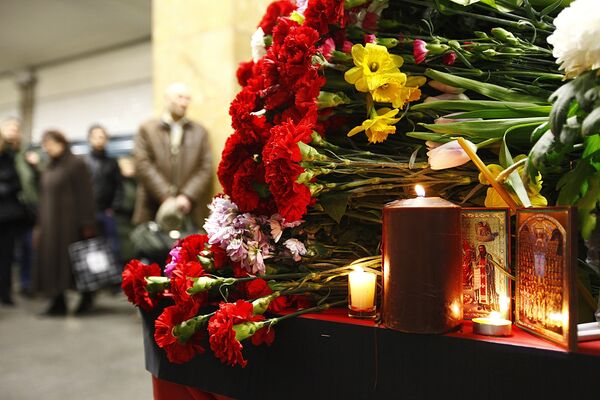Moscow is holding a day of mourning after two suicide bombings killed dozens of people in the capital's subway on Monday.
The first blast came at around 8:00 a.m. (04:00 GMT) at the central Lubyanka station beneath the former KGB headquarters, which now houses the Federal Security Service. The second bomb went off at 8.38 a.m. (04:38 GMT) four stops along the red line at the Park Kultury station, within walking distance of the Kremlin.
Early on, Muscovites began lighting candles and laying flowers in memory of the victims of the blasts inside the two stations, where stalls and tables for flowers have been set up.
Just hours after the blasts, officials and web-bloggers started a massive campaign calling on Muscovites to donate blood for those injured in the blasts, with members of police reported to have been the first to do so.
The main TV channels have dropped advertising and entertainment programs from their schedules.
Late on Monday, President Dmitry Medvedev visited the Lubyanka station and laid flowers. He called the terrorists "beasts," saying that "regardless of their motives, what they did is a crime by any legal or moral standard."
"I have no doubts whatsoever that we will find them and eliminate all of them," he added.
While no group has yet claimed responsibility for the attacks, the head of the Federal Security Service (FSB), Alexander Bortnikov, said the bombers may have had links to Russia's volatile North Caucasus.
Russia has been fighting militants in the North Caucasus for almost two decades, including two brutal separatist wars in Chechnya. Analysts suggest Monday's attacks are revenge for a recent operation in Chechnya that saw the deaths of over 20 radical Islamic fighters.
There has been a lot of speculation that the two female suicide bombers who blew themselves up in the Moscow subway could have been trained for the attacks by the notorious North Caucasian gang leader Alexander Tikhomirov, also known as Said Buryatsky, who was killed in a police sweep in the southern Russian republic of Ingushetia in early March.
The leading Russian business daily Kommersant said the gang leader was personally involved in training around 30 suicide bombers, nine of whom had already carried out suicide attacks.
MOSCOW, March 30 (RIA Novosti)


